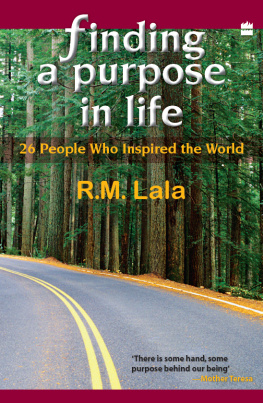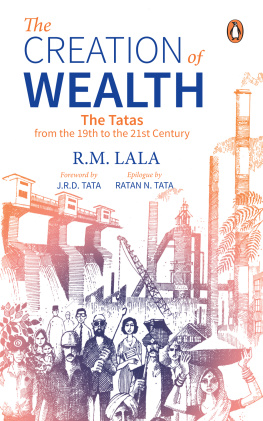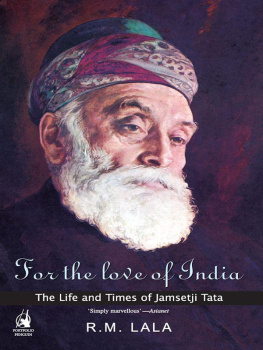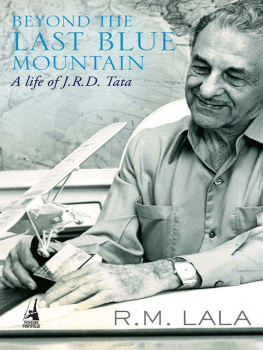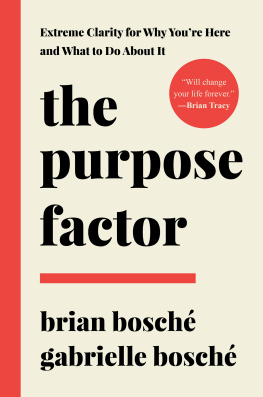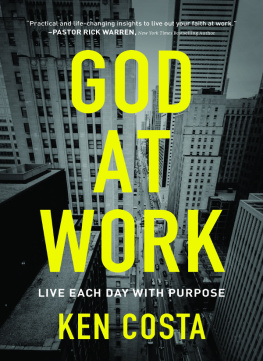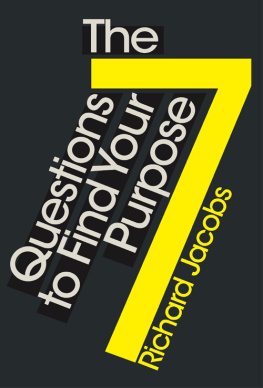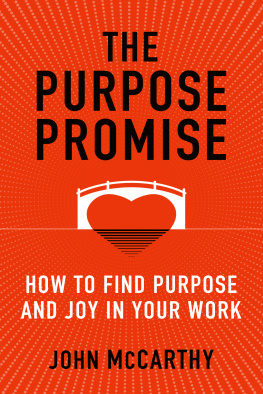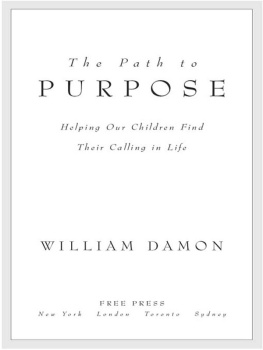
F INDING A P URPOSE IN L IFE
26 People Who Inspired the World
R.M. LALA
SKETCHES BY VIJAY MOHITE

Dedicated to my dear friend, Dr M.S. Swaminathan, who gave me the opportunity to deliver the Hindu Millennium Lecture on The Role of Purpose in Life, and to N. Ram, Editor-in-Chief of the Hindu Group of Papers, who suggested I do a book on the subject.
Man has a great need to know whether it is worthwhile to be born, to live, to struggle, to suffer and to die and whether it is worthwhile to commit oneself to some ideal superior to material and contingent interests whether there is a why that justifies his earthly existence This, then, is the essential problem. Giving a meaning to a human being, to his choices, to his life, to his journey.
Pope John Paul II, 1979, Castel Gandolfo
Contents
T here is a pilgrim soul in all of us, an inner searching that continues throughout our lives.
Lacking a purpose in life, despairing millions seek refuge in drugs and alcohol, in crime and other antisocial behaviour. They are the walking wounded of our world. They have no one to turn to. Those with money may lose themselves in unbridled consumerism or sex the good life but deep within, the nagging feeling remains. Man wants to know his place in this bewildering world, a place where he can anchor his spirit, find a direction, and pursue a purpose beyond his own advancement. Those who find it, have a sparkle in their eyes even at eighty years of age; those who dont, look vacant-eyed even at forty.
Such was my state when I graduated from college at the age of nineteen. Although intellectually well furnished, I was spiritually starved. In my quiet moments, I would ask myself: Why am I in this world? Is there a God? What is the meaning of life? Like many today, I found an immediate outlet in frenzied activity, handling more than one task at a time in my case, journalism and publishing. But a career is not a purpose. A noble purpose is one that is deeply satisfying not only to your own self but also beneficial to others. Lucky are those whose career and purpose match. The rest of us have to find a purpose beyond our careers or within them.
M Y O WN S EARCH
I had a Marxist teacher who, when I was fourteen, robbed me of what little faith I had. By sixteen, I was traversing the desert of atheism, arguing against the existence of God. That phase passed. Not long after, at the age of twenty-one, a personal crisis hit me. By then, I was open to believing in God. If there is a God, I said to myself, let me have proof of it.
I found a purpose in my life by trying to live by moral standards and through my discovery of God. In this book, I have elaborated on this. This impacted my career in writing as well. I made a transition from fierce criticism to writing which I felt would enable people to find something deeper and more satisfying in their lives. Many years later, in 1979, I met Mother Teresa. As I bid her goodbye and turned to leave, she said to me: Write something beautiful for God. I found a purpose for writing.
When I completed my major biography of the pioneer aviator and illustrious industrialist J.R.D. Tata, Beyond the Last Blue Mountain , he asked me, What do you plan to write on next? I replied spontaneously, I dont know, sir, but anything I write will attempt to make man better and nobler.
F EET OF THE D ISCIPLES
In the course of a sabbatical in 1975-76, I attempted my first book, In Search of Leadership , which spoke about leaders ranging from Emperor Asoka and Julius Caesar to Mahatma Gandhi and Martin Luther King. I searched for the relationship between ends and means and how immoral means can even alter good ends. Moreover, I tried to provide insights into the conduct of men whose purpose went beyond self-satisfaction and fame. I had one advantage. As editor of Himmat Weekly for a decade, I had the opportunity to meet many interesting people who had found a purpose, Vinoba Bhave, for instance. In their book, Power and Morality , Pitirim Sorokin and Walter Lunden speak of Mahatma Gandhi, Vinoba Bhave, Abbe Pierre and Albert Schweitzer. Three of these have been covered in this book. Sorokin and Lunden write that the influence of these men seems to be coming from a superabundance of the supreme energy of unselfish love, with which they are graced and which they indefatigably express in their thoughts, words and deeds. Their influence comes from the same source which made Jesus, Buddha and other apostles of Love, possibly the most influential individuals among all the leaders in human history.
Elsewhere Sorokin writes
After all, Jesus, Buddha, Mahavira, Lao-tze or Francis of Assisi had neither arms, nor physical influence upon millions and for determining the historical destinies of nations and cultures. Nor to obtain their influence did they appeal to hate, envy, greed and other selfish lusts of human beings. Even their physical organism was not that of the heavyweight champion. And yet, together with a handful of their followers, they reshaped the minds and behaviour of untold millions, transformed cultures and social institutions, and decisively conditioned the course of history. None of the greatest conquerors and revolutionary leaders can even remotely compete with these apostles of Love in the magnitude and durability of the change brought about by their activities.
While writing some books on the House of Tatas, I studied the evolution of the personality of its founder, Jamsetji Tata, from an ambitious businessman to one who had made the advancement of the nation his business. To this purpose he gave himself and a good part of his wealth. At the time of my writing, there was a scandal in India involving the printing and selling of fake government stamp papers, robbing the exchequer of Rs. 30,000 crores or more. The contrast was striking.
At that time, I was invited to give the Hindu Millennium lecture in Chennai. Asked to choose my subject, I decided to speak on The Role of Purpose in Life. A few months later, N. Ram, editor-in-chief of the Hindu group of newspapers, suggested, Why dont you write a book on this theme? It is a very important subject.
This book is not meant to be the final word on the subject. Rather, it aims to stimulate the reader to think out his or her purpose in life.
I have divided the book into six sections. The first deals with three personalities who have shown the power of purpose, Mahatma Gandhi, Abraham Lincoln and Albert Schweitzer. The second considers the difference between ambition and purpose, career and purpose, and instinctive and acquired purpose. The third section deals with the main avenue for a noble purpose, namely, compassion, and how the compassionate work of distinguished individuals has affected the lives of those around them. It includes the purposeful leadership demonstrated by Martin Luther King in America, and Nelson Mandela and Desmond Tutu in South Africa. In both these instances the course of history was altered and bloodshed prevented. The next section looks on purpose that continues from father to son. The leadership of Indias former President, Dr A.P.J. Abdul Kalam, his concern for his country and its development, reflected in his engagement with the youth and his vision for a developed India, is considered in the fifth segment. Finally, I deal with the pathways to finding a purpose, and the impediments that one may have to reckon with in the process.
I remember speaking on The Role of Purpose in Life to a group in Pune. At the end of my address, quite a few people engaged me in a discussion. Among them was a middle-aged lady, somewhat short, stocky and fair, whom I have been unable to forget. With a pleading voice she had asked me, How do I find a purpose in my life? Two years later, when I started writing this book, I was able to track her down. This book is for her and so many like her. If it helps them to find something deeper in their lives, I shall be more than gratified.
Next page
